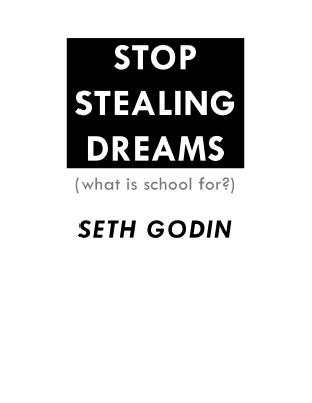Review: Stop Stealing Dreams #
(Image: Seth Godin)
Summary #
Seth Godin recently published Stop Stealing Dreams which discusses the origins of public education in the United States and how the 100-year institution no longer serves our needs. He proposes several strategies with which to reshape mass education.

Recommended method for avoiding dream theft. Gotta catch 'em all.
(Photo: Bruce McAdam on Flickr)
Commentary #
Godin's thesis is that the original goals of public education have outlived their utility (by many years) and that we ought to replace those goals and reinvent education. Briefly, here are a few interesting points Godin makes:
-
Public education was originally a means of preventing child labor. Any resemblance to real education was purely coincidental.
-
The key goal of public education was obedience—a prerequisite for being a good worker in an industrial setting.
-
Rote memorization reflects an environment of information scarcity. This is no longer the case.
-
In the past, kids used to dream of becoming something. Now their aspirations are so trivial—they dream of becoming assistants to someone famous.
Godin proposes a list of new attributes that public education should foster (e.g., Awareness, Caring, etc.) as well as new topics that ought to be taught (e.g., Leadership, Computer Programming, etc.).
Overall, the thrust of the book resonated with me and I found it very enjoyable. However, there are a couple of issues that create the impression that the target audience for this book are people who already agree with its premise; it lacks persuasive punch.
-
The use of anecdotal evidence makes for interesting reading, but when stronger evidence is available, it undermines the argument (a similar criticism is often applied to Malcolm Gladwell's writing).
-
The format of the book is, as Godin explains, a compilation of blog posts. While repetition is understandable, the sheer length of the text becomes a psychological barrier for those who do not already have a strong desire to read it.
Format aside, I only had a few minor points of disagreement:
-
While we should nurture a child's dreams, we ought to provide him the means to execute on those dreams, not merely dream bigger dreams. Godin ultimately makes this point, but because of the book's title and the recurrence of dream-related references, it is somewhat obscured in the text.
-
Godin and I clearly have a strong aversion to rote memorization. However, I believe there are still areas of knowledge (albeit few) where having immediate access to information—as you're thinking about it— allows you to outperform those who need to look it up. (I am told that Richard Feynman mastered mathematics so that he could continue to think about and solve hard problems without resorting to mere computation.)
See Also #
-
Stop Stealing Dreams for the book by Seth Godin.
-
Khan Academy and Patient Problem Solving for our discussion of alternative methods for teaching mathematics.
